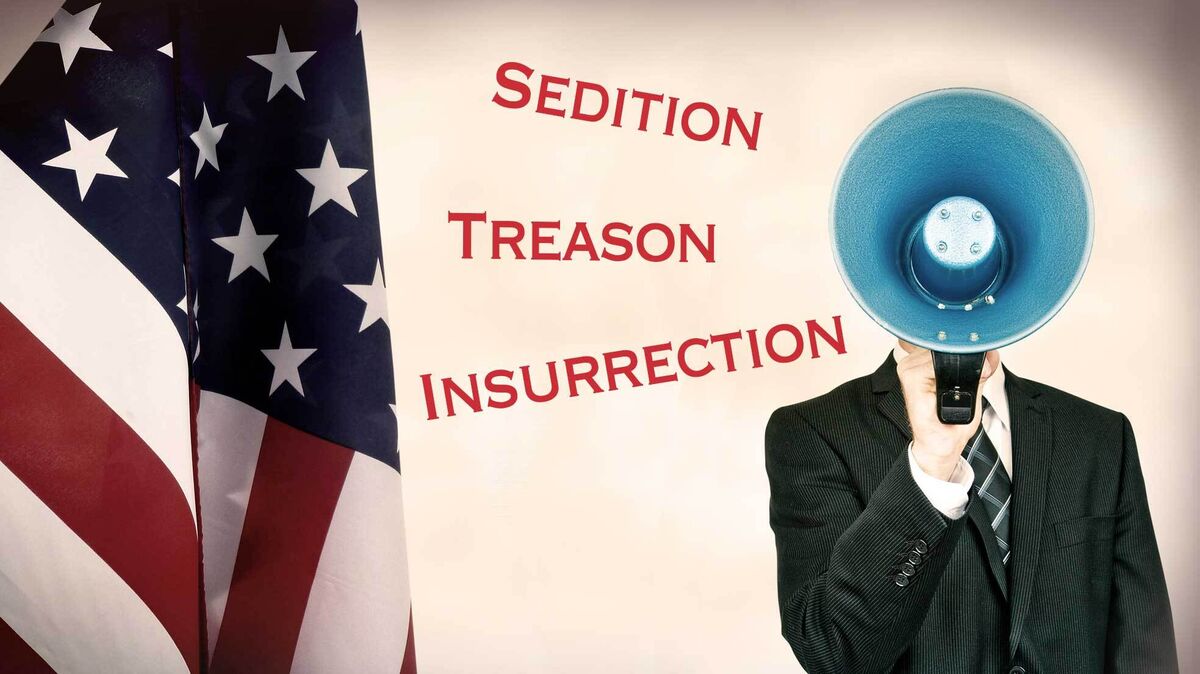
The terms sedition, treason and insurrection are closely related to one another, but they do not mean exactly the same thing. In order to understand what sedition is, it's also important to understand the concepts of treason and insurrection.
What Is Sedition?
Sedition refers to conspiring with others to incite rebellion against lawful authority. Sedition, along with treason and insurrection, are addressed in the United States Code (115 U.SC. §§ 2381 – 2391). Under federal law, sedition occurs when two or more persons conspire to commit certain actions against the United States (U.S.) government. The conspiracy to commit such acts is sedition, whether or not the actions are actually attempted or carried out.
- conspiring to take down, overthrow or destroy by force the U.S. government
- levying war against the U.S. government
- opposing the authority of the U.S. government by force
- hindering, delaying or preventing any U.S. law from being carried out
- taking, seizing or possessing U.S. government property via force
Sedition can take place in any U.S. state or territory, as well as any other location under the jurisdiction of the U.S. (such as a military base). The punishment for sedition can include up to twenty years in prison and/or a fine. The amount of the fine is not specified in the code.
What Is Treason?The concept of treason can be broadly interpreted as treachery, but it has a specific definition in federal law. Treason occurs when anyone who owes allegiance to the United States of America, such as a citizen or resident, commits certain acts against the U.S. government. There is actually a treason clause in the U.S. Constitution; it is the only crime specifically referenced within the Constitution.
- levying war against the U.S.
- aligning with enemies of the U.S.
- providing assistance or comfort to enemies of the U.S. (within the country or in any other location)
The punishment for treason varies widely. People who commit treason can be put to death, put in prison (for a minimum of five years) and/or fined (at least $10,000). Those found guilty of treason are disqualified from holding any public office in the U.S.
What Is Insurrection?
What is an insurrection? An insurrection is an organized effort by a group of citizens against their government. An insurrection usually involves force. Insurrection can be committed against any lawful governmental authority.
Under U.S. federal law, a person can be held responsible for being in any way associated with an insurrection or any kind of rebellion against the laws or authority of the U.S. government. Involvement may involve any of the following with regards to an insurrection or rebellion:
- inciting
- setting foot on (being there)
- assisting
- engaging in
- giving aid or comfort to those who do any of the above
Anyone found guilty of insurrection can be put in prison for up to ten years and fined an unspecified amount. Such persons will also be prohibited from holding any public office in the U.S.
Examples: Clarifying Sedition vs. Treason and InsurrectionA person can commit any or all of these acts. Some actions are seditious and treasonous and may also involve insurrection.
- Sedition is a conspiracy to engage in an unlawful act, such as committing treason or engaging in an insurrection.
- When at least two people discuss plans to overthrow or take down the government, they are committing sedition.
- When two or more people make plans to do something that would delay or prevent the government from carrying out a law, their behavior is sedition.
- Speaking in a way that would encourage others to take up arms against the government is sedition.
- Anyone who actually carries out or participates in such plans (or helps those who do) is committing treason.
- Anyone who actually takes up arms against the government would be levying war, and so would be committing treason.
- A person who provides a foreign government with information that could be used to take down the government has committed treason.
- A person or group that levies war against the lawful government is guilty of treason.
- A person who does or says incendiary things that would incite a group to seize or storm government property has incited an insurrection.
- A person who participates in an uprising against the government using force has participated in an insurrection.
- A person who provides financial support to enable an organized group to act against the government has assisted with or given aid to an insurrection.
Summing Up Key Differences
The difference between these three terms can be broken down into simple explanations.
- The act of plotting or conspiring constitutes sedition.
- The act of treason occurs when action is taken, but direct action against the government is not the only way to commit treason. It is also treasonous to assist those who are taking action in any way, or to align with enemies of the government.
- A person who is in any way involved with a group that in any way contributes to a group of people rising up to act against the government has committed insurrection.
Additional Considerations for Penalties
The penalties for sedition, treason and insurrection are not the full extent of penalties faced by those who commit such acts. For example, a person who engages in any of these acts could easily engage in slander or libel, mail fraud or other crimes. Those engaged in treason or sedition could find themselves facing charges of unlawful entry, wrongful imprisonment, weapons violations, and many other legal violations (depending on the specific actions taken).
Get to Know the Government
Now that you are aware of what sedition, treason and insurrection mean, take the time to learn more about how government actually works. Start by reviewing examples of different kinds of democracy. From there, you may want to learn about different types of governments around the world.